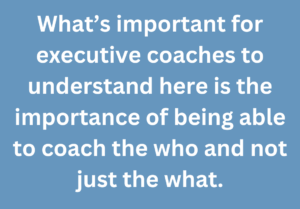What’s Trending Now
Trend #1: Neuroscience will Play a Growing Role
Put simply, neuroscience is the study of the brain and the nervous system and how these systems function to turn sensory stimuli into output, actions, and/or reactions. Coaches will employ more neuroscience-based techniques (such as neuroplasticity) to help leaders become more effective at leading themselves and others based on what our brain tells us about being human. The intersection of neuroscience and coaching has been studied for some time and yet there is still so much to learn.
There is clearly a growing interest in this topic and how it can apply to coaching to increase effectiveness and sustainability of change. One of our favorite books in the area of neuroscience and how it might apply to workplace behavior is Your Brain at Work by Dr. David Rock. We also like to share Dr. Rock’s SCARF model with our clients when applicable. Another book we recommend is Conversational Intelligence by the late Judith Glaser.
Trend #2: Remote Coaching is Here to Stay
The pandemic upended many fixed beliefs including the thought that effective coaching should be conducted in person. What happened instead was a veritable explosion in remote coaching using video platforms like Zoom and Teams. We’ve now learned that going virtual with executive coaching not only works, but it’s since become a standard business practice. Sponsors and coachees are more than happy to accept video coaching and pay the same rates as before. If anything, it’s created a level of flexibility and convenience that didn’t exist before.
Savvy coaches must know how to use remote coaching to grow their clientele, enabling their coaching practice to go worldwide. The coaches best suited for this incredible expansion of their coaching geography may be those who are well-traveled, keenly understand various cultures and are multilingual.
Trend #3: Leadership Coaching is Going Mainstream
Leadership coaching is well beyond being strictly for executives. More and more people at the middle manager level are benefiting from coaching. More affordable coaching options and pricing will continue to make coaching available to even wider swaths of professionals. Known as the democratization of coaching, it’s a good trend for executive coaches since people who’ve experienced the power of coaching will likely want more of it as they grow up the ladder of success.
Another benefit of spreading coaching around is that it will support a culture of continuous learning and growth. The learning organization is one fit for the future and coaching can support such a transformation and make it sustainable.
Trend #4: The Growing Importance of Measurable Results
Smart companies invest cautiously, and they want to see what they’re getting in return from leadership coaching. For this reason, coaching is becoming more outcome-driven, with the tracking of measurable results through assessments, structured feedback, surveys, data analytics, and other tools.
Increasingly, clients will choose coaches who can clearly demonstrate how they help their coachees move the needle in meaningful ways. We’ve created some videos that talk about ways to measure coaching effectiveness. The first one can be watched here. A book we recommend that has good content on measuring coaching’s effectiveness is Executive Coaching with Backbone and Heart by Mary Beth O’Neill.
Trend #5: An Increase in Coaching Certification Requirements
The coaching industry is not regulated. In truth, anyone can go into business and call themselves an executive coach, business coach or career coach. For this reason, it’s becoming increasingly important for coaches to have a coaching credential from an established body such as the ICF or the CCE to get a foot in the door with many organizations.
What goes along with this trend is to see that a coach has been trained via an accredited coach training program that is aligned with and endorsed by the ICF and CCE. By doing so, this paves the way for the coach to get a credential from either of the aforementioned organizations. Organizations such as the Center for Executive Coaching (of which our president, Michael Neuendorff, is a faculty member) will grow in importance and stature since they are accredited.
Going one step further, coaches who hold an ICF credential will likely want to move to the PCC level as quickly as possible since the number of ACCs continues to increase and may therefore lessen the power and differentiation of being credentialed.

Trend #6: The Continuing Growth of Niche Coaching
Traditional leadership coaching is mostly generic and applicable to executives across a number of different industries and sectors. But every company has its own needs and objectives, and this has given rise to the practice of industry specific niche coaching (for example, a healthcare leadership coach, or small business coach, or sales coach). This type of specialization in coaching, paired with a credential, can really help a coach stand out from the crowd.
Each coach must come to their own decisions about establishing themselves firmly in a niche, but we can offer some advice in this area with this video on choosing a niche. Another way of looking at it would be to let the market tell you what to focus on. We address that angle in this video.
Trend #7: Increase in Demand for Leadership Coaching
We noted earlier the rise in looking for measurement of the ROI of coaching. The ICF in conjunction with PwC found that coaching could attain nearly a 7x ROI. With such statistics in mind, companies are clearly recognizing that executive coaching can drive performance. Indeed, those companies that don’t hire coaches may find themselves looking behind the times.
Executive coaching is no longer viewed as a luxury for a few high potentials or a remedy for a leader in trouble, but a vital and proven leadership development modality. More and more companies are embracing this trend and building it into their development budgets.
Trend #8: The Rise of Group or Team Coaching
Group coaching (simultaneously involving several coachees) tracks closely with our mainstreaming trend #3. By working with groups of people instead of the traditional one-on-one, more people are able to benefit from coaching within a cost-effective and efficient framework. The rise of remote coaching also enables this to be easily done since the team does not need to be all in one place with the coach.
Another factor driving the growth of team coaching is the impact a coach can have on an organization when groups of people are being coached. Big changes can happen when a team gets comfortable with candid conversations, raises their level of service to various stakeholders, and becomes a team focused on continuous learning and improvement.
Trend #9: Ever-increasing Digitalization
Besides live person to person virtual coaching, coaching delivery via apps are now in use. Just as apps might help a person stay on track with a financial plan or exercise regimen, they can also help managers make smarter decisions in a variety of commonly encountered workplace situations. The impact on leadership coaching of app-based delivery is far from fully realized, but this is an area of coaching to keep an eye on as AI-driven software becomes ever more intelligent.
What’s important for executive coaches to understand here is the importance of being able to coach the who and not just the what. Truth be told, there are AI models already capable of coaching the what. The conversations are more akin to training than coaching, but don’t doubt that people are getting benefits from having a wealth of ideas presented to them to improve their ability to manage their time for example.
Trend #10: Increased Focus on Emotional Intelligence
Some forward-thinkers envision a future where most of the work done by people will require strong interpersonal skills and emotional intelligence. This will be the way that people clearly distinguish themselves from AI-driven software programs that do all sorts of routine work. Since enterprises will place a premium on leading with emotional intelligence, it’s very likely that executive coaching will focus more closely on helping leaders develop their emotional intelligence. We’ve written a series of articles on leading with emotional intelligence on our sister site.
This trend complements the previous one where we suggest that a forward-looking coach ensure they are fully capable of coaching the who. It is also in alignment with the trend related to the growth of an understanding of neuroscience in the coaching field.
These are trends now shaping the future of executive coaching. As this growing and fluid field evolves further, it’s likely that new trends will emerge that we can’t even predict yet. Such is the nature of an industry fueled by explosive growth and rapidly-developing technology, and it’s best if we, as coaches, track these trends and seek to align with them.
Want to learn more? Here are 3 proven ways to elevate your skills as an executive coach.
If you would like to be trained and certified as an executive coach via our accredited coach training program, learn more about the options here.
Here are other articles and videos related to this article:
Articles
- What will take your coaching to the next level?
- 5 Models for Leadership Coaching
- Have you tried audio only coaching?
- One simple change that could positively affect your coaching business
YouTube Videos
- One Simple Change That Could Affect Your Coaching Business
- How Great Website Content Can Promote Your Coaching Services | Using Blogs, Assessments, & LinkedIn
- A Device That May Advance Your Virtual Coaching
- Psychology, Therapy, and Executive Coaching with Dr. Anne Welsh
- Using Emotional Intelligence in Executive Coaching With Expert Trevor Blondeel
Photo copyright: Featured photo is from ©cottonbro studio via Pexels. Second photo is from ©fizkes via 123RF.







